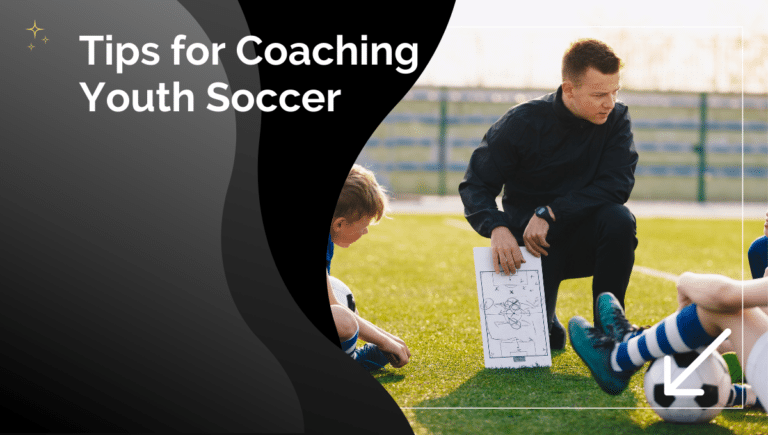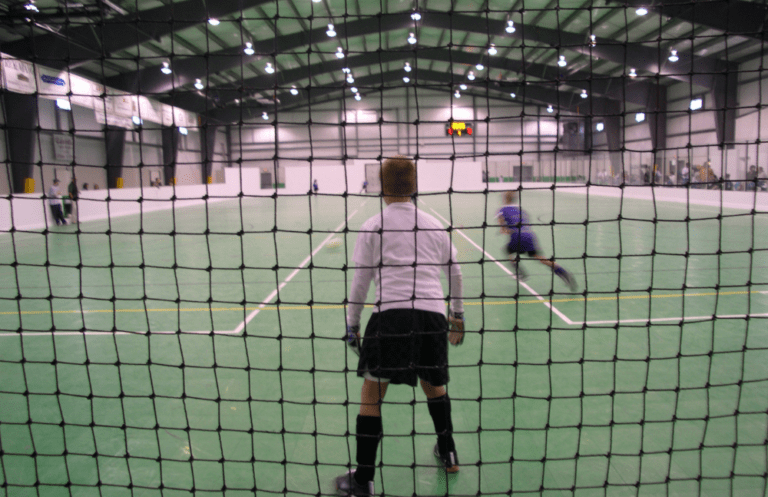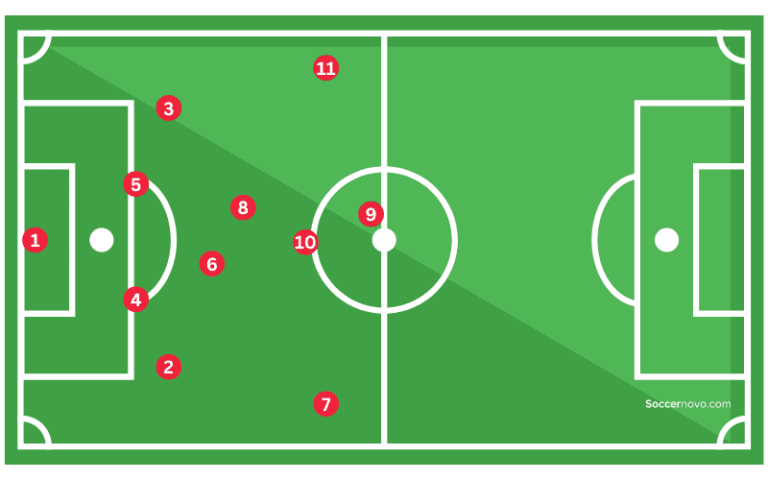Getting More Playing Time in Soccer: Tips and Strategies for Success
Playing time is a critical component of a youth soccer player’s development and success. Every player desires to play more in games, but it’s not always easy to achieve and sometimes it’s out of a player’s control.
Coaches have their reasons for selecting certain players, and it’s not always solely based on talent. For example, many youth soccer teams will split time equally to help develop all players. In this case, wins and losses aren’t a priority.
I think it makes complete sense to develop every player as much as possible at the younger age groups. You really never know when a player will mature and keeping them engaged and playing is critical.
What if you are playing at a high level and playing time isn’t split evenly? One of the most essential habits you can develop as a soccer player is to focus on becoming a better player.
It’s not just about being the most skilled player on the team; it’s also about being a team player, being coachable, and having a positive attitude.
When you focus on improving your skills and mindset, you become a more valuable asset to the team, and your coach is more likely to give you more playing time.
Another crucial aspect of getting more playing time is understanding why you’re not playing as much as you’d like.
- Is it because you’re slower than your teammates?
- Are you doing your own thing and not paying attention to the coach?
- Are you so focused on yourself that it appears selfish?
- Are you missing training sessions?
Once you identify the areas you need to improve on, you can work on them during practice and prove to your coach that you’re committed to playing more.
If you are looking to increase your game time, there are steps you can take. I’ll lay out some things you can do to get more time on the field.
Improve Skills and Fitness
Technical Skills
One of the most important aspects of getting more playing time in soccer is having strong technical skills. At its basic-level, this includes dribbling, passing, shooting, and ball control.
To improve your technical skills, consider practicing the following:
- Practice dribbling through cones or around obstacles to improve your ball control and footwork.
- Work on passing accuracy by practicing short and long passes with both feet.
- Practice shooting on goal from different angles and distances to improve your accuracy and power.
- Participate in small-sided games (Rondos are great) to improve your decision-making and ability to read the game.
Tactical Skills
Tactical skills are just as important as technical skills in soccer. This includes understanding the game, knowing your position, and making smart, quick decisions on the field.
To improve your tactical skills, consider practicing the following:
- Study the game by watching professional matches and analyzing different tactics and strategies.
- Understand your position and the role you play on the field.
- Work to make smarter and quicker decisions on the field. Anticipating movements of your team and the opposing team can help increase your soccer IQ.
Physical Fitness
Physical fitness is crucial for soccer players, as it allows you to maintain a high level of performance throughout the game. Consistent exercise and healthy habits will often immediately translate to the game of soccer.
To improve your physical fitness, consider practicing the following:
- Engage in regular cardiovascular exercise, such as jogging, running or cycling, to improve your endurance.
- Include strength training exercises, such as squats and lunges, to improve your overall strength and power. Depending on your age, you can start introducing weight lifting.
- Practice interval training to improve your speed and agility on the field.
- Make sure to stretch before and after games and practices to prevent injuries.
Attitude and Work Ethic
 Attitude and work ethic are critical factors in determining how much playing time a soccer player will get.
Attitude and work ethic are critical factors in determining how much playing time a soccer player will get.
Coaches want players who are motivated, coachable, hard-working, disciplined, and great teammates.
No matter how good of a player you are, if your attitude is negative then you’ll find yourself falling behind. Not only will the coach focus on developing other players but your teammates could stop communicating with you.
Here are some things to consider:
Coachability
Being coachable means being open to feedback and willing to learn from mistakes. Coaches want players who are receptive to instruction and can apply it on the field. Showing a willingness to improve and having a positive attitude towards feedback can go a long way in earning more playing time.
Honestly, being coachable will not only get you more playing time but you will become a better player. Sometimes we don’t know what we don’t know.
Teamwork
Teamwork is essential in soccer. Players who work well with their teammates and understand their roles within the team are more likely to get playing time.
Coaches want players who are unselfish and willing to make sacrifices for the good of the team.
Communicating often and effectively with teammates not only keeps you engaged but gets more respect from coaches, players and club staff.
Effort and Determination
Effort and determination are two critical components of a strong work ethic. Players who consistently give their best effort on the field and show a willingness to work hard are more likely to get playing time.
Coaches want players who have a high work rate. Players who display a strong work ethic are often rewarded with more playing time.
Communication with Coach
Sometimes proving yourself with your play doesn’t always translate to more playing time. If this happens, talking to your coach can be advantageous.
You’re not talking to them to convince them you want more playing time. Instead, you’re communicating with them so you understand where they are at and how you can improve the team.
Asking for Feedback
One of the best ways to improve your playing time is to ask your coach for feedback. This shows your coach that you are committed to improving and willing to take constructive criticism.
Ask your coach what you can do better and what specific areas you need to work on. This will give you a clear idea of what you need to focus on during training and games.
Showing Initiative
Showing initiative is another way to catch your coach’s attention and increase your playing time.
Arrive early to practice and stay late to work on your skills.
Ask your coach if there are any extra drills or exercises you can do to improve your game.
Take the initiative to help your teammates during practice and games. This will show your coach that you are a team player and willing to do what it takes to improve your game for the team.
Being a Respectful and Helpful Teammate
Being a good teammate is an important aspect of increasing your playing time.
Show your coach that you are a positive influence on the team by encouraging your teammates and staying positive even when things aren’t looking great.
Be respectful to your coach and club staff.
Avoid complaining or making negative comments about your playing time or your teammates.
Your coach will take notice of your positive attitude and may reward you with more playing time.
Game Performance
Making an Impact
One of the best ways to earn more playing time is to make an impact on the field. Coaches want players who can make a difference and contribute to the team’s success.
Here are some ways to make an impact:
- Score goals or create more scoring opportunities
- Have a high work rate and don’t take any plays off
- Defend aggressively and win important tackles
- Move the ball quickly after receiving it
- Show good sportsmanship and be a positive influence on the team
Playing Multiple Positions
Being a versatile player can increase the chances of playing more. For example, a player who can play the wing and midfield may be called upon if someone gets injured.
Coaches often need players who can fill in for injured or absent teammates, and being able to play different positions can make you a valuable asset to the team.
Make sure to practice and develop your skills in different positions to become a well-rounded player.
Especially at the youth level, don’t get so focused on one position. You’ll naturally gravitate towards a position as you get older.
Executing the Game Plan
Coaches appreciate players who can execute the team’s game plan effectively.
This means understanding and following the coach’s instructions, playing with discipline, and making smart decisions on the field.
Here are some tips for executing the game plan:
- Pay attention during team meetings and listen to the coach’s instructions
- Communicate with your teammates on the field to ensure everyone is on the same page
- Stay focused and avoid making careless mistakes
- Be willing to make sacrifices for the team, such as playing a defensive role if needed
- Stay in the formation that’s established by your coach
- Don’t run around like a mad man/woman chasing the ball
When Should a Parent Step in?
As a parent, it can be difficult to watch your child sit on the bench for the majority of a game.
 However, it’s important to remember that playing time is ultimately up to the coach’s discretion.
However, it’s important to remember that playing time is ultimately up to the coach’s discretion.
It’s important for parents to know when it’s appropriate to step in and when it’s best to let the coach handle the situation.
In most cases, it’s best to just stay out. Let the coach coach. And, talk to your child about things they can control and use it as a good teaching moment.
With that said, here are some situations where it may be appropriate for a parent to step in:
- If your child is young and consistently not getting any playing time, it may be worth having a conversation with the coach to see if there are any areas where your child can improve or if there is a specific reason for the lack of playing time.
- If your child is being bullied or mistreated by teammates or coaches, it’s important to step in and address the situation with the coach or league officials.
- If your child is injured or sick and the coach is not aware, it’s important to communicate this information to the coach to ensure your child’s safety and well-being.
However, there are also situations where it’s best for parents to let the coach handle the situation:
- If your child is not playing as much as you would like, but is still receiving some playing time, it’s important to trust the coach’s decision and not undermine their authority.
- If your child is not performing as well as other players, it’s important to let the coach make the decision on playing time based on performance and skill level. Awareness is key.
- If your child is not happy with their playing time, but is not experiencing any mistreatment or safety concerns, it’s important to encourage your child to communicate with the coach and work on improving their skills and performance.
Remember, as a parent, it’s important to support your child and their love for the game, but also to respect the coach’s decisions and authority.
Parents need to look at the bigger picture and trust the process. Many soccer organizations have a process in place to develop players. By having a long-term view, playing time sometimes becomes obsolete.
By working together and communicating effectively, parents, coaches, and players can create a positive and successful soccer experience.
Should a Player Quit Because of Playing Time?
When a player is not getting the playing time they want, it can be frustrating and demotivating.
In some cases, the player may feel like quitting the team altogether.
However, quitting should not be the first option. Before making any drastic decisions, it is important to consider the following:
- Why do you want more playing time? Is it because you genuinely love the sport and want to contribute to the team, or is it because you want to impress your friends or family?
- Have you talked to your coach about your concerns? If not, it’s important to approach your coach in a respectful manner and ask for feedback on how you can improve your game.
- Are you putting in the effort during practice and games? If you’re not giving 100%, it’s unlikely that your coach will give you more playing time.
- Is your mental health compromised because of your coach? Or, are you getting anxious driving to trainings and games?
If, after considering these factors, you still feel like quitting is the best option, it’s important to do so in a respectful and mature way.
Talk to your coach and explain your reasons for leaving. It’s also important to remember that quitting a team can have long-term consequences, such as missing out on the opportunity to develop your skills and potentially hurting your chances of playing in the future.
Ultimately, the decision to quit a team because of playing time is a personal one that should be carefully considered.
It’s important to remember that playing time is not always guaranteed, and that being a part of a team is about more than just getting on the field.
By putting in the effort and working hard, players can improve their skills and increase their chances of getting more playing time in the future.
Conclusion
Getting more playing time in soccer is important for many players. While it can be challenging, there are several things you can do to increase your chances of getting on the field.
It’s important to have a positive attitude and work ethic. Coaches want players who are dedicated and willing to put in the effort to improve.
Additionally, being a good teammate and showing respect for your coaches and the game can go a long way in earning more playing time.
Another key factor is skill level. To increase your playing time, it’s important to continually work on your skills and improve your overall game.
This can include practicing on your own, attending camps or clinics, and seeking feedback from coaches and teammates.
Finally, it’s important to be patient and persistent. Getting more playing time may not happen overnight, but if you stay committed and continue to work hard, you will see progress over time.
Remember, earning more playing time is not just about individual achievement, but also about contributing to the success of the team.
By following these tips and staying dedicated to your game, you can become a valuable asset to your team and increase your chances of seeing more time on the field.
Best of luck and remember to always love the sport!

Written By: Beau Bridges
Beau is the founder of SoccerNovo, dedicated to helping players and parents navigate the youth soccer landscape. As a former youth coach and soccer parent, he shares insights on player development, recruiting, and the ever-evolving soccer scene in the U.S.
Let’s connect






